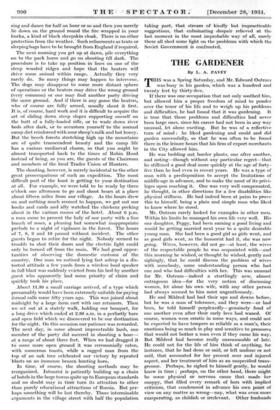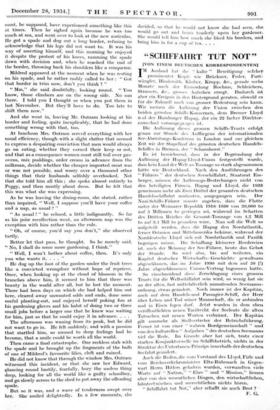THE GARDENER
By L. A. PAVEY THIS was a Spring Saturday, and Mr. Edward Outram was busy in his garden, which was a hundred and twenty feet by thirty-five. - If there was one occupation that not only soothed him, but allowed him a proper freedom of mind to ponder over the tenor of his life and to weigh up his problems and difficulties, he had found that it was gardening. It is true that those problems and difficulties had never been large ones, since' his career had not been in any way unusual, let alone exciting. But he was of a reflective turn of mind: he liked gardening and could and did garden successfully, so that he was often to be found there in the leisure hours that his firm of export merchants in the City allowed him.
He was bedding out border plants, one after another, and noting—though without any particular regret—that he stiffened a good deal more quickly at the age of forty- five than he had even in recent years. He was a type of man with a predisposition to accept the limitations of middle-age in advance, and to make the most of its privi- leges upon reaching it. One was very well compensated, he thought, in other directions for a few disabilities like physical stiffness. He had indeed been at pains to prove this to himself, being a plain and simple man who liked to know where he stood.
Mr. Outram rarely looked for examples in other men. Within his limits he managed his own life very well. His one daughter, Peggy, had been earning a good living and would be getting married next year to a quite desirable young man. She had been a good girl as girls went, and as good girls went, as the humorist had it, she was now going. Wives, however, did not go—at least, the wives of the respectable people he was acquainted with—and this morning he wished, or thought he wished, gently and sighingly, that he could discuss the problem of wives with somebody, some understanding person who had one and who had difficulties with her. This was unusual for Mr. Outram—indeed a startlingly new,' almost outrageous idea—for the very notion of discussing women, let alone his own wife, with any other person had always seemed to him most ungentlemanly.
He and Mildred had had their ups and downs before, but he was a -man of tolerance, - and they were—or had been, he told himself perplexedly—genuinely fond of one another even after their early love had -waned. Of course, women were erratic in some ways, and could not be expected to have tempers as reliable as a man's; their emotions being so much in play and sensitive to pressures that would not bother a man even if they' came his way: But Mildred had become really unreasonable of late: He could not for the life of him think of anything, for instance, that he had done or said, or left undone- or not said, that accounted for her present sour and injured aspect, and her treatment of him as an unspecified trans- gressor. Perhaps, he sighed to himself gently, he would know in time ; perhaps, on the other hand, there might be some physical or nervous cause that made her snappy, that filled every • remark of hers with implied criticism, that condemned in advance his own point of view on any matter as wrong—nay, what was even more exasperating, as childish or irrelevant. Other husbands must, he supposed, have experienced, something like this at times. Then he sighed again because he-•was -too much at sea, and went over to look at the new auriculas. He got a spade and dug out a long border, refusing to acknowledge that his legs did not want to. It was his way of asserting himself, and this morning he enjoyed it despite the protest of his knees, ramming the spade down with decision and, when he reached the end of the border, throwing back his shoulders like a conqueror.
Mildred appeared at the moment when he was resting on his spade, and he rather rashly called to her : " Got that border in trim now, don't you think? "
" Mm," she said. doubtfully, looking round. " You know, those climbers are on the wrong side. No sun there. I told you I thought so when you put them in last November. But they'll have to do. Too late to shift them now."
And she went in, leaving Mr. Outram looking at his border and feeling, quite inexplicably, that he had done something wrong with that, too.
At luncheon Mrs. Outram served everything with her usual efficiency, though with a slight clatter that seemed to express a despairing conviction that men would always go on eating, whether they earned their keep or not, and that as a consequence women must still toil over gas- ovens, mix puddings, order cream in advance from the milkman, decide whether the cheaper imported meat was or was not possible, and worry over a thousand other things that their husbands selfishly overlooked. Not that she told him all this ; she spoke almost entirely to Peggy, and then mostly about dress. But he felt that this was what she was expressing.
As he was leaving the dining-room, she stated, rather than inquired, " Well, I suppose you'll have your coffee an a nap, as usual ? "
" As usual ! " he echoed, a little indignantly. So far as his pobr recollection went, an afternoon nap was the exception with him rather than the rule.
" Oh, of course, you'd say you don't," she observed tartly.
Better let that pass, he thought. So he merely said, " No, I shall do some more gardening, I think."
" Well, I won't bother about coffee, then. It's only you who wants it. . . . "
He dug up the foot of the garden under the fruit trees like a convicted wrongdoer without hope of reprieve. Once, when looking up at the cloud of blossoM in the branches above him, it seemed to him that there was beauty in the world after all, but he lost the moment. There had been days on which she had helped him out here, cleared away unwanted odds and ends, done some useful planting-out, and enjoyed herself poking fun at his gardening gloves and his habit of doing two or three small jobs before a larger one that he knew was waiting for him, just so that he could enjoy it in advance. . . .
The afternoon was waning from its peak, but he did not want to go in. He felt suddenly, and with a passion that startled him, so unused to deep feelings had he become, that a smile could be worth all the world.
Then came a final catastrophe. One reckless stab with the spade and he brought up the fragments of the bulb of one of Mildred's favourite lilies, cleft and ruined.
He did not know that through the window Mrs. Outram witnessed this incident, or that she saw her Edward, glancing round hastily, fearfully, bury the useless thing deep, looking for all the world like a guilty schoolboy, and go slowly across to the shed to put away the offending spade. But so it was, and a wave of tenderness swept over her. -She- smiled delightedly. In a few moments, she decided, so that he . would not know she had seen, she would go out and -beam tenderly upon her gardener. She would tell him how much she liked his borders, and bring him in for a cup of tea.. .



































 Previous page
Previous page